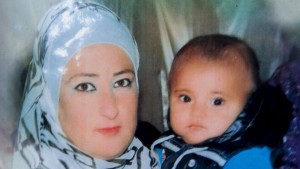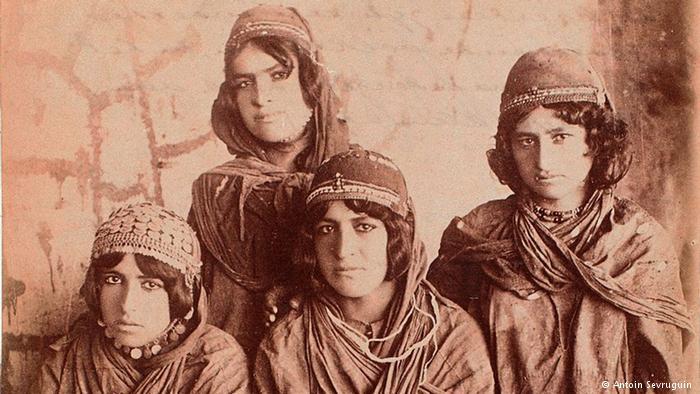“The tragedy of this family should not be the subject of this kind of satire.”
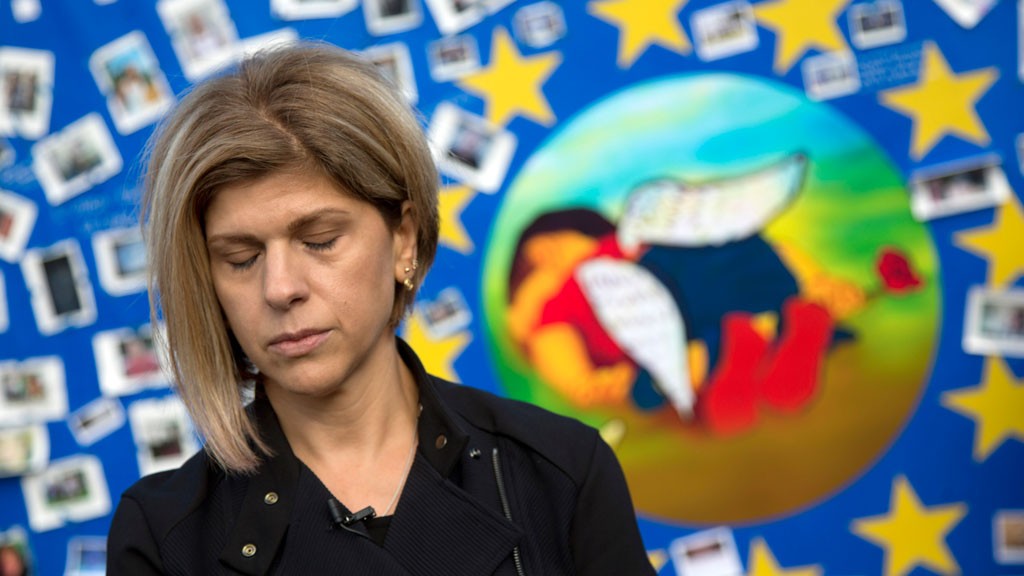
Fatima Kurdi, from Canada, stands next to a painting of her late nephew, Aylan Kurdi, on a board outside of EU headquarters on Monday, Sept. 14, 2015. Aylan Kurdi (3) and his family was on the way to her when the small rubber boat he and his family were in capsized in a desperate voyage from Turkey to Greece. © picture-alliance/AP Photo/V. Mayo
The refugee crisis in Europe has led #CharlieHebdo, the satirical French magazine, to publish some highly provocative cartoons. I won’t be buying this edition, said DW’s Grahame Lucas. Charlie Hebdo has always courted controversy. Ever since it was founded it has tested the limits of free speech over and over again. The magazine has consistently published its cartoons with complete disregard to personal, political, social or religious sensitivities according to the principle that satire knows no limits. And this principle remains at the heart of satire in the Western media simply because it plays a vital role. It is a means of presenting or challenging opinion in a compact and devastating form which no lengthy editorial can match.
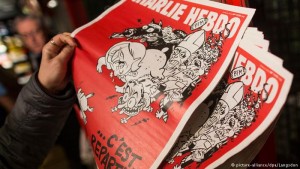
On the back page of this edition of Charlie Hebdo the caricatures that depict Aylan Kurdi were published. © picture-alliance/dpa/Langsdon
Charlie Hebdo was attacked by Islamist extremists in January this year because it had published cartoons of the Prophet Mohammad. This was to demonstrate – like Danish cartoonists earlier – that nothing is out of bounds to a satirist, that no bans by whomsoever should be allowed to prevent criticism where criticism is due. After all, we in the West have a free media despite all of its flaws, and are free to choose what we buy and read and what we ignore.
The magazine is now at the centre of a media storm once more because of some cartoons it has published on its back page about the refugee crisis in Europe. The most controversial ones show drawings of #Aylan Kurdi, the Syrian toddler who drowned recently on the way from Turkey to Greece. The shocking photos of Aylan’s lifeless body on the beach went round the world and captured the horrors of the refugee tragedy like no other. Charlie Hebdo’s caption runs: “Welcome to the migrants, so close to the goal…” And adds in front of a drawing of a fast food restaurant “promotional offer: kids menu 2 for the price of 1”.
Its intent is to satirize the West’s life style and the economic aspirations of refugees in search of a better life in Europe. But it also suggests that their image of Europe is a stereotype, far from accurate or complete. Another cartoon shows an image of Jesus Christ walking on water – as related in an episode in the Bible. The text runs “Christians walk on water, Muslim children drown”.
This is a direct attack on so-called Christians in Europe who have opposed taking in refugees during the crisis. And it also attacks those who believe one religion is superior to another. While the attempt to satirize recent events in Europe is without doubt necessary and legitimate, I personally believe that Charlie Hebdo’s decision to use drawings of Aylan Kurdi to transport this message is a serious error of editorial judgment. The tragedy of this family, the death of a child (and his brother), the suffering of the refugees, should not be the subject of this kind of satire.
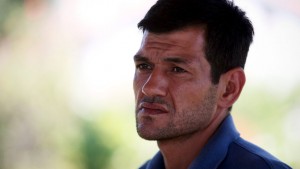
Abdullah Kurdi, father of three-year-old Aylan Kurdi brought his family home to Kobani, Syria to be buried. © Reuters/G. Gurbuz
It is more than tasteless, I find it disgusting. But there are no doubt many people who will disagree with me. And of course I respect their opinions even if I hold a different view. That is what the freedom of opinion is about. But I will not be buying this edition for sure.
No-one should challenge freedom of speech because of these tasteless cartoons, and those who do are the people to be feared most. They are the ones who would impose restrictions on our free media and introduce censorship. Freedom of speech is the life blood of democratic society even if I, as an individual, do not always approve of what it produces. As a journalist I can sum up my position with a famous quote, attributed perhaps rightly or wrongly, to the French philosopher Voltaire: “I disapprove of what you say, but I will defend to the death your right to say it.”
Author: Grahame Lucas
Editor: Marjory Linardy
WTO RECOMMENDS
It was a freezing cold December morning in India. I was wrapped up in my thick blanket. The alarm buzzed, coupled with my mother panicking about her early morning list of “to-dos”. After a late night shift at work I was reluctant to wake up. So I ignored both, but not completely. The sun rays streaming through the window helped me fight off my laziness. I now sat on the bed, blanket in place, a cup of steaming hot coffee in my hands, reading the morning newspaper and caught a glimpse of what was going on at my neighbour’s porch. (From May 12, 2012)
Robbed of childhood
Be it going to school, playing with friends or listening to stories from your grandparents- all these memories of childhood bring a profound feeling of happiness. But everyone is not fortunate enough. For hundreds of girls throughout the world childhood comes to an end sooner than it should. These girls get married, look after their husband’s household and bear children at a time when they should be going to School. (From November 29, 2012)
‘A recognition for neglected children’
Kailash Satyarthi has been awarded the Nobel Peace Prize for his fight against child labor. In an exclusive DW interview, the activist talks about the importance of the prize and plans to work alongside co-winner Malala. For decades, Kailash Satyarthi has dedicated his life to helping millions of children forced into slavery. (From October 13, 2014)



